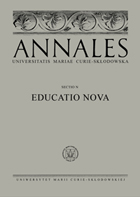Dziecko wiejskie na tle polskiego dyskursu edukacyjnego
dwudziestolecia międzywojennego, czyli o mniej
znanym przyczynku do regionalizmu w szkole
Rural Child in the Polish Educational Discourse during the Interwar Period or about Less Known Roots of Regionalism at School
Author(s): Anna MlekodajSubject(s): Social Sciences, Education, Sociology, Rural and urban sociology, Sociology of Education
Published by: Wydawnictwo Naukowe Uniwersytetu Marii Curie-Sklodowskiej
Keywords: educational discourse; pedology; needs of a rural child; rural child; regionalism; education reform
Summary/Abstract: The article is devoted to the process of discovering the specificity of life and development of a village child, initiated at the turn of the second and third decades of the 20th century. It was one of the consequences of the then developing educational discourse, supported by the achievements of child psychology, pedology, and the New Upbringing trend. In 1929, the first Polish research on the level of development of children from urban and rural environments was conducted. The results were very unfavorable for children from the countryside. This gave an impulse for further action. In 1930, in the pages of “Praca Szkolna” (“School Work”), a competition was announced among teachers to describe a rural child from various regions. Twenty-two papers were submitted, the best of which were published in the book Dziecko wsi polskiej (A Child of the Polish Countryside). These works allowed us to penetrate both the problems faced by rural children at school and the difficulties faced by teachers working in the countryside. To a large extent, they resulted from the lack of a proper diagnosis of the educational and upbringing needs of a rural child and from difficulties in cooperation between schools and villages. The perspective of changes in this area was opened only by regionalism, introduced to school curricula as a result of the education reform in 1932, which was to support the education of rural children and contribute to the integration of the school with the local community. Thus, the teaching characteristics of a rural child contributed, in a sense, to the introduction of regionalism in Polish schools.
Journal: Annales UMCS Sectio N Educatio Nova
- Issue Year: 6/2021
- Issue No: 1
- Page Range: 155-184
- Page Count: 30
- Language: Polish

